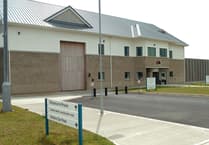Email exchanges relating to a pivotal moment in the Manx government’s response to the Covid pandemic have been released under Freedom of Information.
They show that information contained in a presentation given on Friday, March 13, 2020, by then medical director Dr Rosalind Ranson was ‘toned down’ before being presented to the Council of Ministers the following Monday (March 16).
But the FoI response from the Department of Home Affairs says that ‘almost all’ of Dr Ranson’s information was included in the final presentation to the Council of Ministers and the email exchanges have to be viewed in the context of the unprecedented situation that the island was facing.
It said the phrase ‘toned down’ used by DHA chief executive officer Dan Davies ‘appears simply to have been a poor choice of words’.
The FoI requests were submitted in May by journalist Paul Moulton who has been heavily critical of the government’s delay in responding to them.
Dr Ranson was awarded £3.19m in compensation in May this year after an employment tribunal found she was unfairly sacked from her job as the island’s top medic.
Giving evidence to the public account committee investigating the government’s response to the Covid pandemic, she said she had advised as early as March 16 that the borders should be closed and claimed senior doctors’ advice was not being passed on to Ministers.
It was not until March 27 that the borders were closed to all arrivals except those required for critical national infrastructure or for the preservation of human life.
On March 13, six days before the first positive case on the island, the Manx government followed the UK, and Public Health England’s advice, and moved to delay more drastic measures.
But the same day a power point presentation by Dr Ranson and a DHSC officer to the coronavirus working group made it clear that without rapid intervention, the Manx health service would be overwhelmed, with the hospital filled to capacity within six weeks of the virus hitting.
She suggested action was taken now regarding border controls, stopping social gatherings and progressing isolation.
The DHA in its response said the impact of the presentation ‘clearly resonated’ and it was becoming clear that the island’s unique situation would require a departure from the approach being taken by Public Health England.
The challenge for officers, it said, was how to relay the clinical concerns raised, that rapid and robust early intervention must be taken, when up to this point the government stance was that Covid-19 was low risk.
Emails show that at 5pm on March 13 Mr Davies asked Dr Ranson for a copy of her presentation to send to then chief secretary Will Greenhow. The medical director provided the document, telling him: ‘We have a window of opportunity’.
On March 15, Mr Davies emailed Mr Greenhow, then chief executive Kathryn Magson, then chief financial officer Caldric Randall and then Department for Enterprise chief executive Mark Lewin to say: ‘I have provided a slide deck which could be used for CoMin on Monday.
‘It hopefully helps them to get in the space where they understand the reasoning behind why we are proposing additional measures which are deviating from the PHE advice. We will try and keep it at a high level so that they don’t get into the weeds.
‘Kathryn – I have taken some of Rosalind’s slides to help illustrate the point, but hopefully toned down.’
The DHA said in its FoI response: ‘There has been some speculation about the use of the words “toned down” in an email from the chief executive officer of DHA to other officers. On reviewing the email in the context of other emails, this appears simply to have been a poor choice of words.
‘Almost all the original information in Dr Ranson’s presentation, in terms of the potential impact faced and the nature of mitigations that should be considered, was included in the final presentation to the Council of Ministers. Some information was not included, simply to give a clear focus to the policy decisions sought by officers from the Council of Ministers at the end of that meeting.’
In the email exchanges on March 15 Dr Ranson mentions the need for border controls for essential travel through self-isolation, which ultimately is what was determined the following day by the Council of Ministers.
There is no mention in the emails released of her specifically advocating full border closure.
Later that same day, Ms Magson emailed to say she had made some changes to the slides addressing her concerns about increasing capacity at Noble’s and the impact on the economy of travel restrictions and self-isolation. But Mr Davies replied, saying he thought there was now too much detail. We only have an hour and we need to get them over the line in respect of the big decisions,’ he said.
At the CoMin meeting, Ministers agreed that anyone arriving from 23.59 the next day would be required to self-isolate for at least 14 days, whether or not they had symptoms. Forthcoming elections and that year’s TT were to be cancelled and it was recommended that a state of emergency be declared.
Following the meeting, Mr Davies emailed Dr Ranson to thank her. He said: ‘I’m really grateful to you for your determination in getting this done. I think we have made a huge leap forward. We don’t have all the measures, but we have a commitment to revisit them over the coming days as the situation changes.’
Those other measures, which were suggested by Dr Ranson in a revised document emailed on March 15, included closures of schools, bars and restaurants. These were not included in the presentation to Ministers.
In a paper dated April 16, Dr Ranson acknowledged the actions taken by the government had been ‘vital, and to date successful’.



